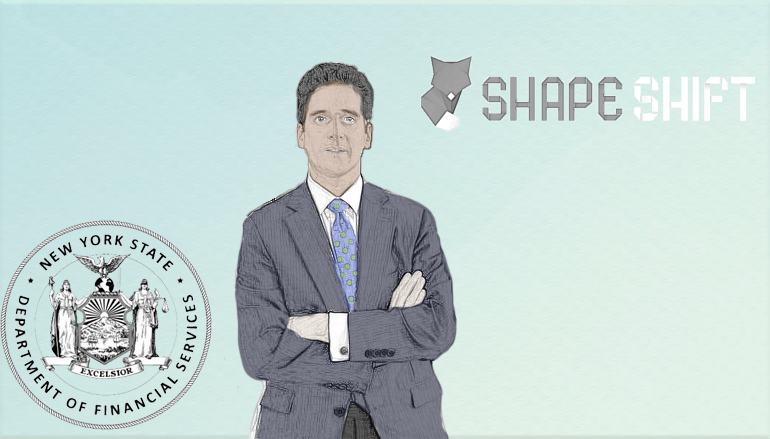
ShapeShift.io CEO Erik Voorhees was recently interviewed by Paul Buitink, Jop Hartog, and Tuur Demeester on the deBitcoin weekly hangout, and he discussed his company’s recent reaction to the finalized BitLicense. Last week, it was announced that ShapeShift.io would no longer offer its services to the good people of New York, which now joins North Korea as one of the few jurisdictions where the instant exchange is blocked. Voorhees explained why ShapeShift.io made this decision, and he also shared his thoughts on New York Department of Financial Services (NYDFS) Superintendent Ben Lawsky’s move to the private sector.
ShapeShift.io blocking New York customers for ethical reasons
As Voorhees explained during the interview, ShapeShift.io is no longer available to New York customers because the company finds the BitLicense to be “unethical in its requirements.” The ShapeShift.io CEO described the company’s options once the bitcoin-centric regulations were finalized:
“Since [the BitLicense] is becoming law, we had two choices. We could either do something we felt was unethical and continue to serve New York, or we could block New York and leave that market. So, we — of course — had to do the latter.”
The main objection ShapeShift.io had with the BitLicense was that it required bitcoin companies to collect a large amount of private information about their users. The personal information of customers would then be available to any government regulator who wanted to see it. Voorhees went on to explain the ironic nature of this requirement in the new regulations:
“First of all, that information is not needed for the transaction itself — so it’s not like we’re collecting that information for some useful purpose. Users don’t need to provide that to us right now, and collecting it endangers the users because personal information should remain personal wherever it can. And because hacks are so common, because identity theft is so common; it’s really dangerous to collect private information from people unless you need to.”
BitLicense a problem for identity theft?
As Voorhees pointed out, one of the main issues with the BitLicense is that it requires bitcoin companies to collect personal, identifying information about users when that collection of data isn’t necessary for a particular service to function. The BitLicense removes the ability for businesses to process bitcoin transactions for users without taking on the added liability of collecting personal information. Bitcoin companies are essentially barred from allowing users to use the blockchain to send money without filling out long forms with all of their personal info.
Voorhees also explained the seriousness of the identity theft problem to the deBitcoin audience:
“When I was actually researching this a little bit, I was quite amazed at how big of a problem identity theft is. At least in the US — as of a couple of years ago from the government’s own statistics — identity theft was a $24 billion problem. $24 billion of known losses to identity theft in one year in just America. That amount was greater than the amount of losses for all other kinds of theft, including home burglary, car theft, and all forms of property theft combined.”
Ben Lawsky will help you navigate laws he created
Many individuals in the bitcoin community have become annoyed and angered at Ben Lawsky due to his intentions of creating a new digital currency consulting firm that will help businesses navigate the very laws that he helped develop at the NYDFS. It’s obvious that Voorhees agrees with those outraged individuals, and he did not hold his tongue when asked about the subject in the deBitcoin interview:
“This is the very definition of crony capitalism. Someone in a privileged position in government making a bunch of rules, then leaving to profit off the rules they made by charging people the entrance fee to the museum of horror that they created for them.”
Voorhees then noted how this sort of activity is allowed to happen out in the open:
“It’s not even a secret. He just says this when he’s on CNBC and stuff, and no one thinks for a second, ‘Oh wait, isn’t that kind of corrupt?’ . . . No one even challenges it. It’s [become] so common in the US — so normal — that people don’t even question it. So that’s the state of capitalism in the land of the free.”
No other bitcoin companies have decided to block New York customers up to this point, so perhaps some of them are willing to pay Lawsky’s toll in order to gain access to a New York userbase.

